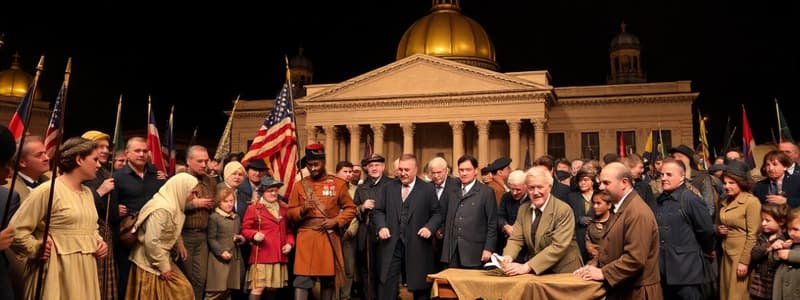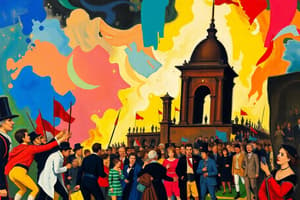Podcast
Questions and Answers
ऐतिहासिक स्रोतों और व्याख्या में पक्षपात पहचानना और स्वीकार करना किस चीज का हिस्सा है?
ऐतिहासिक स्रोतों और व्याख्या में पक्षपात पहचानना और स्वीकार करना किस चीज का हिस्सा है?
- पक्षपात जागरूकता (correct)
- ऐतिहासिक अवधारणा
- ऐतिहासिक पुनर्विचार
- इतिहास लेखन की कल्पना
मध्य युग के बाद और आधुनिक दुनिया के बीच संक्रमण को किस युग में रखा जाता है?
मध्य युग के बाद और आधुनिक दुनिया के बीच संक्रमण को किस युग में रखा जाता है?
- प्रारंभिक आधुनिक इतिहास (correct)
- प्राचीन इतिहास
- मध्ययुगीन इतिहास
- आधुनिक इतिहास
इतिहास के अध्ययन का कौन सा लाभ हमें आज की दुनिया को बेहतर ढंग से समझने में मदद करता है?
इतिहास के अध्ययन का कौन सा लाभ हमें आज की दुनिया को बेहतर ढंग से समझने में मदद करता है?
- वर्तमान को समझना (correct)
- वर्तमान घटनाओं को प्रसंग में रखना
- आलोचनात्मक सोच कौशल विकसित करना
- सहानुभूति और समझ को बढ़ावा देना
ऐतिहासिक पुनर्विचार का क्या मतलब है?
ऐतिहासिक पुनर्विचार का क्या मतलब है?
इतिहास के अध्ययन से कौन सा कौशल विकसित होता है?
इतिहास के अध्ययन से कौन सा कौशल विकसित होता है?
इतिहास का अध्ययन किसका है?
इतिहास का अध्ययन किसका है?
राजनीतिक इतिहास किस चीज पर केंद्रित होता है?
राजनीतिक इतिहास किस चीज पर केंद्रित होता है?
सामाजिक इतिहास का अध्ययन किस बात पर होता है?
सामाजिक इतिहास का अध्ययन किस बात पर होता है?
वैज्ञानिक आलोचना का मुख्य उद्देश्य क्या है?
वैज्ञानिक आलोचना का मुख्य उद्देश्य क्या है?
संदर्भकरण का क्या अर्थ है?
संदर्भकरण का क्या अर्थ है?
स्मृति निर्माण का उद्देश्य क्या है?
स्मृति निर्माण का उद्देश्य क्या है?
सांस्कृतिक इतिहास का अध्ययन किस प्रकार की चीजों पर होता है?
सांस्कृतिक इतिहास का अध्ययन किस प्रकार की चीजों पर होता है?
आर्थिक इतिहास में किसका अध्ययन किया जाता है?
आर्थिक इतिहास में किसका अध्ययन किया जाता है?
Flashcards
पूर्वाग्रह जागरूकता
पूर्वाग्रह जागरूकता
स्रोतों और व्याख्याओं में संभावित पूर्वाग्रहों को पहचानना और स्वीकार करना।
पुनरीक्षणवाद
पुनरीक्षणवाद
मौजूदा ऐतिहासिकNarratives का मूल्यांकन और वैकल्पिक दृष्टिकोण प्रस्तुत करना।
प्राचीन इतिहास
प्राचीन इतिहास
सबसे प्राचीन मानव सभ्यताओं से लेकर शास्त्रीय काल तक का अध्ययन।
आधुनिक इतिहास
आधुनिक इतिहास
Signup and view all the flashcards
इतिहास का अध्ययन
इतिहास का अध्ययन
Signup and view all the flashcards
इतिहास
इतिहास
Signup and view all the flashcards
प्राथमिक स्रोत
प्राथमिक स्रोत
Signup and view all the flashcards
राजनीतिक इतिहास
राजनीतिक इतिहास
Signup and view all the flashcards
सामाजिक इतिहास
सामाजिक इतिहास
Signup and view all the flashcards
आर्थिक इतिहास
आर्थिक इतिहास
Signup and view all the flashcards
सांस्कृतिक इतिहास
सांस्कृतिक इतिहास
Signup and view all the flashcards
स्रोत आलोचना
स्रोत आलोचना
Signup and view all the flashcards
नैरेटिव निर्माण
नैरेटिव निर्माण
Signup and view all the flashcards
Study Notes
Defining History
- History is the study of past events and the changes that have occurred over time.
- It's an attempt to understand the present by examining the past.
- It encompasses various aspects of human experience, from political events to social customs and cultural developments.
- Historians use primary and secondary sources to reconstruct the past. Primary sources include original documents, artifacts, and eyewitness accounts, while secondary sources are interpretations and analyses of primary sources by other scholars.
Branches of Historical Study
- Political History: Focuses on political events, institutions, and leaders. It examines conflicts, treaties, and the development of political systems throughout history.
- Social History: Explores the everyday lives of people and the social structures and customs that shape societies. It examines aspects like family life, gender roles, class systems, and popular culture.
- Economic History: Investigates the economic systems, production, trade, and financial practices of different eras. It explores factors like technological advancements, resource management, and the growth of capitalism.
- Cultural History: Studies cultural expressions and values in various forms, including art, literature, music, and religion. It examines how cultural trends change over time and influences on society.
- Military History: Focuses on armed conflicts, warfare strategies, and the impact of wars on societies and nations. It includes looking at military technology, leadership, and tactics.
- Intellectual History: Examines the development of ideas, philosophies, and theories throughout history. Analyzing how those ideas influenced major events.
Historical Methodology
- Source Criticism: Evaluating the reliability and trustworthiness of historical sources. Historians examine the origins, authorship, and context of documents and artifacts.
- Contextualization: Placing events and figures within their specific historical and social contexts. Considering a wider scope.
- Interpretation: Analyzing the evidence and arriving at interpretations of the past. Different historians may come to different conclusions based on their assessments of the evidence and methodologies.
- Narrative Construction: Organizing the historical information into a coherent and compelling narrative. Presenting the past in a sensible sequence that enhances understanding.
- Bias Awareness: Recognizing and acknowledging potential biases in sources and interpretations. Historians are aware that bias can significantly affect perceptions and narratives.
- Revisionism: Evaluating existing historical narratives and proposing alternative perspectives and interpretations.
Historical Periods and Eras
- Ancient History: Covers the earliest human civilizations through the classical world, including Mesopotamia, Egypt, Greece, and Rome.
- Medieval History: The period following the fall of the Western Roman Empire to the Renaissance. Significant events include the rise of Christianity, the Crusades, and the Black Death.
- Early Modern History: Covers the transition from the Middle Ages to the modern world. This includes significant developments like the Renaissance, the Reformation, and the Age of Exploration.
- Modern History: Spanning from the 18th century up to the present day, the modern era is a time of revolutions, industrialization, scientific advancements, global conflicts, and social movements.
- Contemporary History: Recent events and circumstances of the last several decades to the present day.
Importance of Studying History
- Understanding the Present: History helps us understand the forces that shape the world today.
- Learning from the Past: Historical study provides valuable lessons about mistakes, successes, and human behavior.
- Developing Critical Thinking Skills: Understanding history enhances critical thinking by examining evidence, sources, and perspectives.
- Contextualizing Current Events: Examining historical precedents assists in understanding complex global issues and conflicts.
- Promoting Empathy and Understanding: Historical study enables people from different backgrounds and cultures to understand and empathize with different experiences.
Studying That Suits You
Use AI to generate personalized quizzes and flashcards to suit your learning preferences.
Description
इस क्विज़ में आप इतिहास का अध्ययन, उसके विभिन्न आयाम और प्रमुख शाखाओं के बारे में सीखेंगे। पुरानी घटनाओं के माध्यम से वर्तमान को समझना ही इतिहास का मुख्य उद्देश्य है। इस माध्यम से आप राजनीतिक, सामाजिक और आर्थिक इतिहास पर विचार करेंगे।




